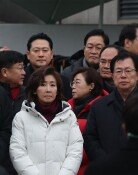Natl Assembly Rocked by Dispute Over U.S. Beef
Natl Assembly Rocked by Dispute Over U.S. Beef
Posted May. 08, 2008 08:27,
Major political parties yesterday blasted the government for kowtowing to U.S. demands in the resumption of American beef imports to Korea.
Lawmakers vented their criticism at a hearing of the parliamentary committee on agriculture, forestry, maritime affairs and fisheries on Koreas beef negotiations with the United States.
The ruling and opposition parties blasted what they called excessively lenient negotiation tactics by the government on revising U.S. beef import terms.
More contention stemmed from arguments that Koreans are genetically vulnerable to mad cow disease and that Washington tried to cover up that a number of cows in the United States had symptoms similar to those of the disease.
▽ Govt backed down over negotiating terms
Speaking to the National Assembly, Rep. Kang Ki-gab of the progressive Democratic Labor Party disclosed confidential reports on the sanitary conditions of U.S. beef imports issued April 10.
He blamed the government for giving the agriculture minister free rein over limiting cattle age, a hot source of contention.
The ministry told in a briefing to the presidential transition committee in January that the Korean government should lift the cattle age limitation in accordance with the U.S. implementation of a ban on using cattle feed containing animal remnants, Kang said.
Seoul, however, backed down to Washingtons request, leaving the matter to ministerial discretion.
The government had been firm in insisting on an immediate halt to U.S. beef imports if a case of mad cow disease broke out in the United States and cancellation of export certification of businesses failing to comply with sanitary regulations. The report, however, suggested a shift in government policy that gave discretionary power to the chief negotiator.
Kang said, It makes no sense at all that the minister or the chief negotiator single-handedly dealt with this critical issue. They should be held responsible.
▽ Flip-flop on issue criticized
Certain lawmakers said the governments opinion on beef imports this year is in stark contrast to last years.
Rep. Cho Gyeong-tae of the main opposition United Democratic Party said, The government sent its opinion to the World Organization for Animal Health in April last year, complaining that certain quarantine measures taken by the U.S. and Canada could fail to meet the organizations standards. But the governmental response this year is totally different.
In response, Food, Agriculture, Forestry and Fisheries Minister Chung Woon-chun said, The U.S. was classified a controlled risk country for [mad cow disease] after April last year. Therefore, the governments measure followed international regulations.
Lawmaker Cha Myung-jin of the ruling Grand National Party asked, What caused the government to change its regulations on beef imports? Wasnt the government retreat in the face of mounting U.S. pressure?
On this, Lee Sang-gil, director of the Agriculture Ministrys livestock bureau said, We came up with a variety of countermeasures, but had to comply with international guidelines given the lack of scientific evidence.
▽ Controversy looms over quasi-mad cow disease
Another controversy erupted over a report from Seoul National University that the U.S. government deems 446,000 heads of cattle each year as "high risk" for having symptoms similar to those of mad cow disease.
Choi Gyu-seong of the United Democratic Party said, The university report indicated that 250,000 heads of cattle died of unknown reasons or possibly from mad cow disease. Another 194,200 heads of cattle were classified under the slaughter ban of the U.S. Food Safety and Inspection Service. And 129 heads were reported to show abnormal signs of brain operation.
In response, ministry director Lee said, The report was a thesis submitted by Professor Lee Young-sun of Seoul National University in January 2005, to which we released a report countering his suggestions.
Out of 100 million cattle being raised in the U.S., we screened all of the 770,000 cattle classified as high risk. As the result, we found only two cows with mad cow disease.
The idea that Koreans are genetically prone to the disease was also dismissed by Kang Mun-il, head of the National Veterinary Research and Quarantine Service, who said, No clear statements suggested the idea in those theses.
koh@donga.com sys1201@donga.com







